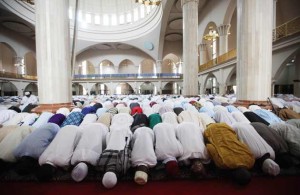The government has provided some protocols that Mosques around the country must adhere to if they wish to reopen.
The announcement was done by the Chieftaincy and Religious Affairs, Samuel Kofi Dzamesi, on June 1, 2020.
Among the protocols was advising each worshipper to use their own mat or a disinfected mat provided by their Mosque.
As part of measures to curb the spread of Coronavirus, government banned religious activities and social gatherings.
READ ALSO: No dancing and waving of handkerchiefs - Gov't announces guidelines for churches
The President however lifted the ban on religious activities on Sunday, May 31, 2020.
 Find below the full guidelines:
- Thermometer guns must be provided for checking the temperature of members at entry points.
- There should be notices communicating ‘No facemask No entry’ policy.
- There should be the provisions of handwashing facilities with running water and soap and FDA-approved alcohol-based hand sanitizer.
- Provision of waste management facilities with bins, bin liners, and single-use tissue.
- Provision of adequate toilet facilities for use as members.
- Regularly cleaning of frequently used communal places, toilet use surfaces and frequently used surfaces such as doorknobs or handles preferably every one to two hours depending on the rate of utilization
- Designate a waiting room or area where a person who becomes sick at the premises or at an event can be isolated from others while making preparations from evacuation.
- Regular cleaning of places where churches use for service at least once every month. For example, fumigation and disinfection must be carried out by recognised entities.
- Professional cleaners with the necessary Personal Protective Equipment and cleaning items to clean the facilities regularly and handle waste appropriately.
- Provide adequate ventilation by opening windows to allow for the maximum circulation of fresh air. If possible, avoid confined air-condition rooms.
- Display approved promotion materials on COVID-19 at vantage points to remind members to keep to social distancing protocol
- Wearing of mask
- Regular handwashing, coughing, and sneezing etiquettes.
- Ensure a no handshake, no hugging, and no spitting policy at all times.
- Follow established evacuation procedures to enable evacuation of a participant, if a participant becomes sick during the event and has to be evacuated.
- Mosques are to form COVID-19 a Task Force comprising of members who are preferably health workers. They must be trained in health preventive measures, infection prevention, and control and evacuation procedures like the Ghana Health Service.
- Unwell persons are not allowed to attend the Mosque.
- Elderly persons and people of any age with underlying medical conditions, heart diseases, diabetes, fever disease are advised to stay away from prayers.
- Sharing personal items such as watches, jewellery, a purse, a phone should be discouraged.
- If any individual is confirmed positive for COVID-19, all contacts must be traced and screened.
- Mosques are to ensure each worshipper uses their own mat or disinfected mat.
- Ablution should be performed at home before heading to the Mosque.
- Worshipers are to use easily removable footwear such as slippers.
- Allow people to come out of the Mosque to collect slippers one after the other instead of crowding at the entrance.
- Bowls for offering are to be placed at the entrance of the Mosques.
- Microphones are to be sanitised immediately after use.
- Mosques are to spend at least five minutes of worship time on COVID-19 sensitisation.





